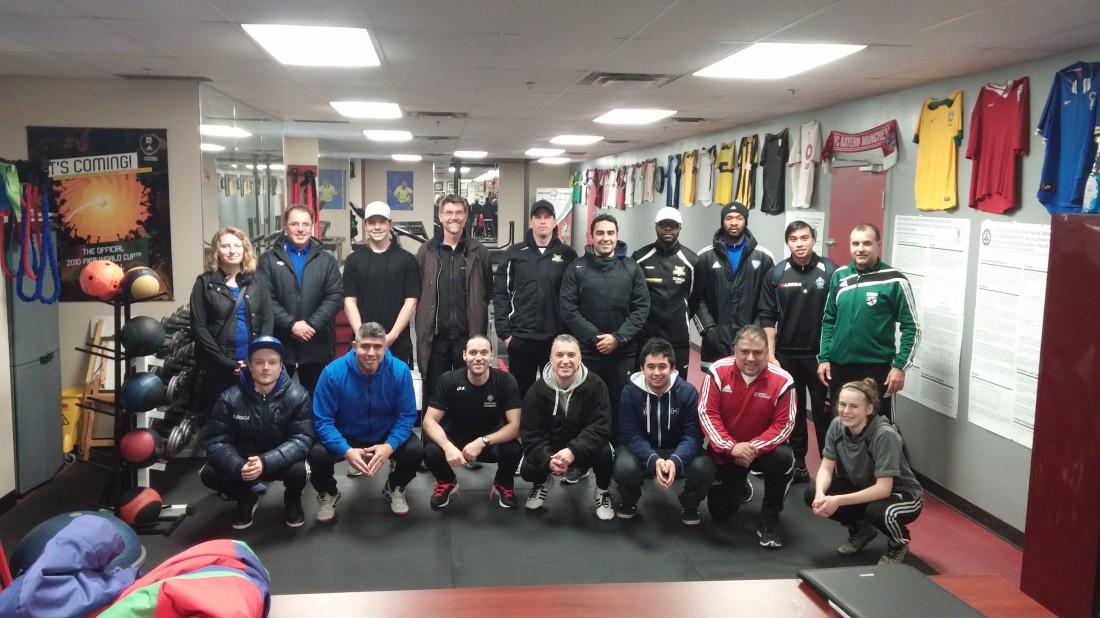Last weekend, January 8th, 9th, and 10th, 2016, I hosted the inaugural Soccer Fitness Trainer’s Course, the first-ever coach education course in Canada focusing on soccer-specific fitness training for individuals and teams. For me, the best part of the course was not the lectures or on-field presentations themselves, but rather the group discussions that occurred frequently before, after, and many times during these presentations! One topic in particular which came up several times over the weekend was how best to determine cause and effect during soccer training.
In the context of soccer coaching, determining “cause and effect” means looking at a particular effect (for example, a team creating more shots on target in a match) and then determining what has caused that effect (for example, 2 weeks of “phase of play” training on patterns of play in the attacking 3rd of the field). During the Soccer Fitness Trainer’s Course, our group discussions often centred on determining what types of training (“causes”) would be best to develop and improve specific physical, technical, or tactical abilities (“effects”) in players and teams. Some of my experience in exercise science has led me to question myself and other coaches when we make assertions about cause and effect in our training sessions.
In order for any coach or fitness coach working with soccer players to accurately determine whether or not their training methods have led to a specific improvement in their players’ or team’s performance, then the specific areas of performance that they are interested in improving through training need to be measured. Based on scientific method, any aspect of performance that is to be measured would be considered a “dependent variable”, which is to say that this aspect of performance may or may not improve, depending on the training or treatment applied to it. Training methods, in this case, would be considered “independent variables” – that is, they are independent because they can be manipulated by the coach or fitness coach in order to try to achieve the greatest improvement to the dependent variable. Measuring changes in a dependent variable which may or may not have occurred as a result of different independent variables applied to it must be done using some kind of standardized, objective, reliable, and valid method of measurement. If there is no objective measurement of a dependent variable, then it is impossible to determine whether or not a change or improvement has actually occurred, and thus it would be impossible to assert cause and effect.
How does all of this relate to soccer coaches and fitness coaches? Recall that in the example provided above, a coach is interested in improving/increasing his or her team’s number of shots on target. This number would be considered a “dependent variable” (improving it is dependent upon the types of training applied to it). The number of shots on target should be measured using some kind of objective method of measurement. The “phase of play” training that the coach uses to try to create a change in the number of shots on target is the “independent variable” (it is independent because the coach is under control as to exactly what type of training is used). “Measurement” of the dependent variable would be fairly simple in this case, as it would require simply counting the number of shots on target the team created in its matches before and after the introduction of the “phase of play” training sessions. If, through several weeks of “phase of play” training, a coach was able to measure an improvement in his/her team’s number of shots on target created, then it would be possible for that coach to assert that their training (“cause”) led to the improvement (“effect”) of creating more shots on target.
The more I think about coaching and fitness training in soccer, the more I realize how important the application of scientific method is to optimizing player and team development. If coaches and fitness coaches do not measure the specific areas of performance they wish to improve through training, then their assertions that their training caused an effect on their teams’ performance cannot be considered valid. Furthermore, if measurement of performance does not occur or is left to a coach’s own subjective opinion, then planning of training with the aim of optimizing performance becomes impossible. As soccer coaches and fitness coaches, we should all be willing to invest time and effort into objectively measuring performance, as this is the only way for us to truly say that our players or teams have performed better as a result of the training we have given them.
I’d love to hear your thoughts about this topic. Drop me a line here to get the conversation started.


Leave A Comment